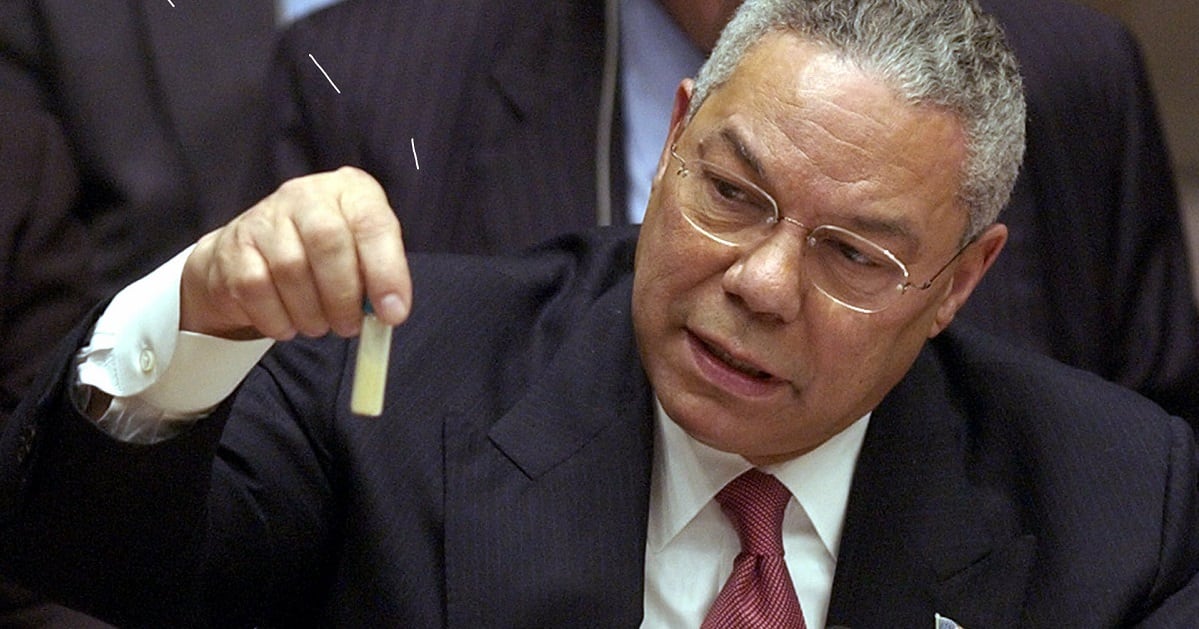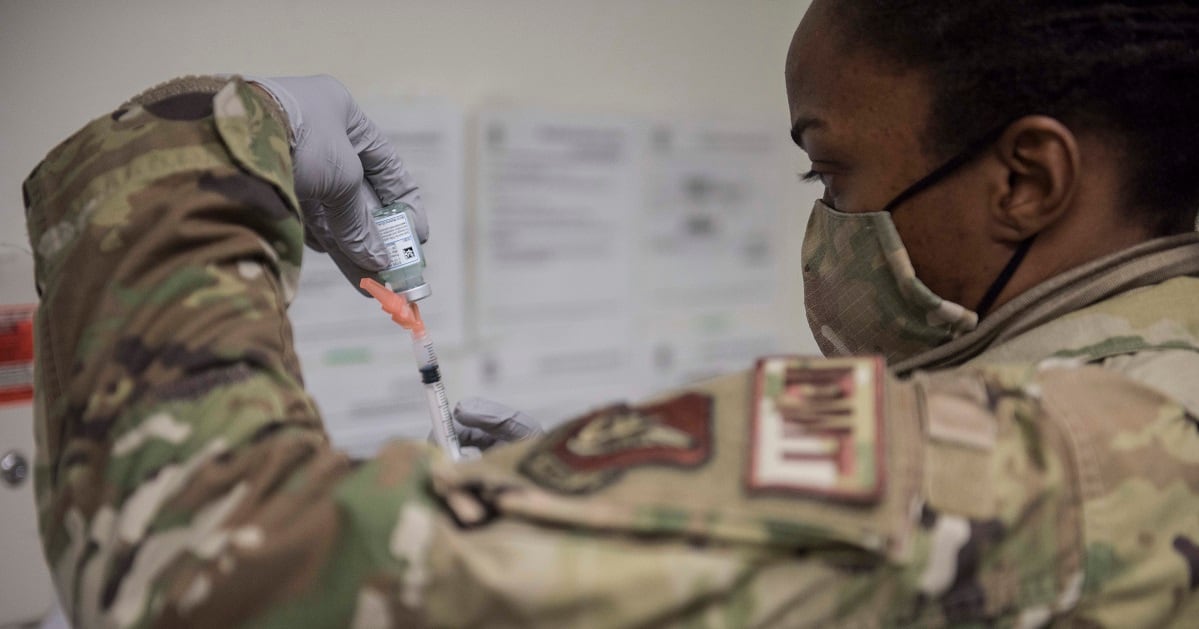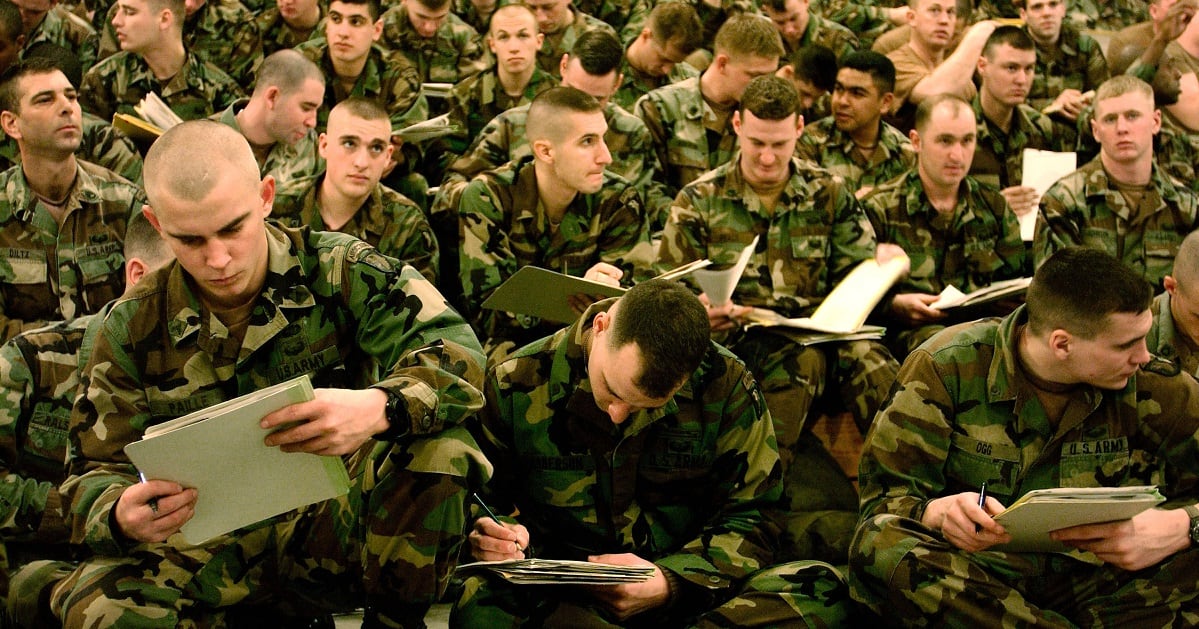During the first eight years that the Pentagon ran the anthrax vaccination program, hundreds of troops refused the vaccine due to perceived health risks or religious concerns — and many of them paid dearly for that decision.
The penalties ranged widely. Some kept on working, others received nonjudicial punishment, lost rank and pay, saw their careers ended or even faced brig time and dishonorable discharges.
Since then, an unknown fraction of those who were punished have sought to have their records corrected, but only a few have had success. Now, even more than 20 years later, some of those cases remain pending before military record corrections boards.
Numbers are hard to pin down, as service record corrections boards have not comprehensively tracked appeals specifically related to the anthrax vaccine. In many cases, those appeals were denied. But more recently, at least two corrections requests — one in 2019 and the other in 2020 — were granted by the Navy, which awarded two Marine veterans some backpay, rank restoration, discharge upgrades and access to veterans benefits.
RELATED

Retired Marine Maj. Dale Saran, a former JAG officer, represented one sailor and two Marines who refused the vaccine on Okinawa in 2000.
Saran stayed involved with the issue. He authored the book “United States v. Members of the Armed Forces: The Truth Behind the Department of Defense’s Anthrax Vaccine Immunization Program,” published in 2020. He also offered legal advice to attorneys with clients facing punishments for refusals.
Saran’s clients and many others were often top performers, some early in their careers and others nearing retirement. But once they refused the vaccine, their commands sought to punish them.
“The venom with which they went after people … I just find that abhorrent,” Saran said. Those service members “were charged and threatened, people’s lives were destroyed.”
HUNDREDS OF APPEALS
Today, military records corrections boards are unable to provide reliable data on the number of appeals involving refusal to get the anthrax shot. When Military Times recently asked about the anthrax cases, the Army, Navy and Air Force were only able to confirm two specific cases.
That’s despite language in the 2001 defense spending bill in which Congress told the secretaries for each of the branches to establish a system for “tracking, recording and reporting separations of members of the armed forces” that result from a refusal to participate in the anthrax vaccine immunization program.”

Years ago, official Pentagon statements indicated that an estimated 350 servicemembers had refused the vaccine between 1998 to 2000. At least three dozen of them were court-martialed and hundreds left the service to avoid the vaccine, according to Pentagon statements in 2005. Also, at least another 149 troops were forced out of the service for vaccine refusal from 2000 to 2004. Those numbers did not include troops who refused but were allowed to leave the service without punishment or simply allowed to not receive the shot and suffered no repercussions.
Retired Air Force Lt. Col. Thomas Rempfer was a vocal critic of the vaccination program. He left the Connecticut Air National Guard as a captain in 1999 due to his own anthrax vaccine refusal but was able to continue his career in the Air Force Reserve.
Rempfer and fellow Guard pilot Lt. Col. Russ Dingle spearheaded efforts, including congressional testimony and lawsuits, to bring a halt to mandatory vaccinations until several major problems with the program could be fixed.
Dingle died of cancer in 2005, Rempfer continues to push for draft legislation — in Dingle’s name to honor the late officer’s role as the intellectual inspiration of their shared work — that would require the Pentagon to proactively correct the records of service members who were punished in any form for their anthrax vaccine refusal.
To that end, Rempfer has created a website, Hoping4Justice.org, that catalogs key documents and a timeline of events in the anthrax vaccination program and recent success by some service members to have their records corrected nearly two decades later.
“There needs to be a well-advertised effort to let these former service members know there’s an opportunity to get their records corrected,” Rempfer told Military Times.
Veterans have sought records corrections through their respective boards from the early 2000s through at least the early 2010s, according to court records. Once those were denied, some of those veterans then appealed to the federal civil courts.
In 2004, a court injunction halted the military’s mandatory vaccination program, declaring the previous six years of vaccine administration to be illegal.
Yet when individual veterans appealed their cases in federal court, the judges mostly rejected those claims, siding with a ruling by the U.S. Court of Appeals for the Armed Forces that dismissed arguments using the 2004 injunction.
Rempfer has written to each administration since President Barack Obama. He has also created draft legislation for Congress to enact that would push the services to remedy the problem. So far, neither have gained backing.

FROM CAREER AIR FORCE TO SUDDEN DISCHARGE
Senior Airman Jeffrey Bettendorf was loving life in the Air Force. He’d joined six years before and already planned to do a full 30 years. An aerospace ground equipment mechanic, he was stationed at Travis Air Force Base, California, in 1998 when his squadron heard they were going to take a new vaccine against anthrax.
Bettendorf told Military Times that most of his fellow airmen were nonchalant about it, basically seeing it as “just another shot.” But he was curious, so he started researching online, where he found government reports, testimony and groups sharing materials about safety issues at the vaccine’s manufacturing plant, along with possible linkages to Gulf War Syndrome.
He compiled two 3-inch binders full of printed materials and scheduled a meeting with his commander.
The senior airman didn’t get far. The commander didn’t even look at the binders. The CO told him that if he didn’t take the shot he faced a reduction in rank, fines and extra duty until he did.
“Then he sent me to a psychiatrist, saying if I’m going to refuse this vaccine, there’s got to be something wrong with me,” Bettendorf said.
He received nonjudicial punishment. At the same time, some of his fellow airmen were reporting side effects after taking the shot. A few told him they wish they’d refused it, too, but feared the consequences.
Bettendorf was reduced to E-3 and discharged in 1999. For most of the next year it seemed like every day there was a news reporter at his house or on the phone wanting to tell his story.
For a while, he followed developments with the program and what the military was doing, but eventually he had to step away.
Over the next few years, he went to the Air Force three times to get his records corrected but didn’t get anywhere.
Bettendorf said he believes that after the 2004 injunction that stopped the mandatory vaccinations, the military should have stepped up.
“As soon as they made that program voluntary they should have reached out to the military members affected and offered them their contracts back and let them back in,” Bettendorf said.

ON HIS WAY TO MARINE OFFICER, THEN KICKED OUT
James Muhammad had come to the Marine Corps a little later than many of his peers but had quickly made up for lost time.
Muhammad enlisted in 1999 at age 24 and made sergeant in less than three years after being a top performer and graduating with honors from multiple programs.
By late 2001, he’d submitted a package to become a commissioned officer and Marine Corps aviator. He’d gone on one deployment right after 9/11, was slated for another and eager for the chance, he told Military Times.
He’d actually taken a flu shot a few months before he’d learned that the anthrax shot was coming. But in the interim he’d become aware of a religious edict against vaccines. A faithful Muslim, he faced a choice: Disobey his commanders’ orders or violate his own religious convictions.
Until that time, the Corps had accommodated his religious beliefs, allowing time for him to conduct his daily prayers and fast during periods of observance. Muhammad assumed he’d receive a religious exemption from the vaccine requirement.
Even if he didn’t get the shot, he fully expected and wanted, to deploy with his unit. “I wasn’t trying to make a political statement,” Muhammad said recently.
Serving in Alpha Company, 8th Communications Battalion, at Camp Lejeune, North Carolina, at the time, Muhammad told the command he was weighing whether or not he could take the shot and needed more time. But his commander said that Muhammad had already made his decision.
So, instead of deploying, receiving a commission and his flying wings, the stellar sergeant was headed for court- martial. People he trusted and respected turned their backs on him.
“This decision broke a lot of relationships,” he said.
“Through the court-martial process and through the inquiry process the story got so confused and twisted that people began to say things like, ‘he’s afraid of going to war,’ ‘he’s a conscientious objector,’ ‘he’s malingering,’ and all kinds of other character assassinations, none of which were true,” Muhammad said.

He faced court-martial in April 2003. He’d been told through his military lawyer that the command could seek the death penalty and that he wouldn’t have much room to state his case based on medical or religious concerns. The only issue would be whether he’d disobeyed an order.
Muhammad decided to enter a guilty plea, with only a layman’s understanding of the complex legal issues at stake. He was busted down to private and served part of a 60-day sentence in the brig before returning to his unit briefly and then being put on “appellate leave,” basically an unpaid status awaiting results of other court cases that could affect the decision in his case.
Any jobs he had in Jacksonville, N.C. were not satisfying, because he was there to be a Marine. As he waited, his house was foreclosed, he had to sell a car and he moved back to the Washington, D.C., area.
When he read that a federal judge ordering a stop to the mandatory vaccine program, he thought it could change everything.
“I checked my mailbox every day waiting for a letter or phone call to come back to active duty, that they realized they made a mistake and they wanted to make it right,” he said. “But that letter or phone call never came.”
He called the Washington, D.C., Navy Yard where he was “assigned” while on appellate status. They had no record of him. It wasn’t until a year later that he showed up on their roster.
Muhammad appealed his case but the lawyer who represented him didn’t even mention the judge’s order to stop the program. He only learned that later from reading the court’s opinion.
A July 2018 memorandum that directed the Pentagon to review corrections requests involving inequity or injustice seemed to directly relate to Muhammad’s case and was appended to his request for review.
In late 2019 he got his first good news in a long time.
The board agreed and redacted the brig time from his DD-214, restored his rank and backdated benefits. Marine Corps headquarters issued him a second Good Conduct Medal and finalized his honorable discharge.
In the interim, Muhammad made a good life with his wife, rearing children, starting a business, becoming a civilian pilot and holding several positions in community-based organizations. But it took years for him to share with peers that he’d been in the military or to reconnect with fellow veterans.
It was just too painful.
Todd South has written about crime, courts, government and the military for multiple publications since 2004 and was named a 2014 Pulitzer finalist for a co-written project on witness intimidation. Todd is a Marine veteran of the Iraq War.





